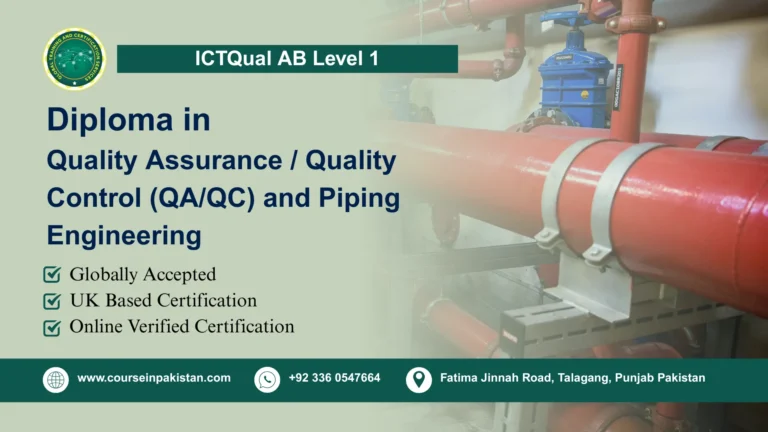
The ICTQual AB Level 6 International Diploma in Supply Chain Management and Logistics is a comprehensive program designed to equip learners with advanced knowledge and practical skills in global supply chains, logistics operations, and inventory management. This diploma is ideal for individuals seeking careers in supply chain management, logistics planning, procurement, and operations management. Learners gain the expertise to optimize processes, enhance operational efficiency, and make strategic decisions in a dynamic business environment.
With globalization and technological advancement, effective supply chain management has become a critical factor in business success. This program combines theoretical concepts with practical assignments, enabling learners to apply industry best practices, manage logistics operations, and drive sustainable performance. Whether you are starting your career or have extensive experience in supply chain roles, this diploma provides internationally recognized credentials that enhance employability and career growth.
Course Overview
The ICTQual AB Level 6 International Diploma in Supply Chain Management and Logistics is a 360-credit, fully assignment-based qualification, allowing learners to study at their own pace from anywhere in the world. This certification is British Council verifiable, MOFA and Embassy attested, making it suitable for global recognition, career advancement, and iqama approval.
The program is suitable for both fresh learners and experienced professionals. Fresh students must complete all 36 mandatory assignments within three years to obtain certification. Experienced professionals with at least 6 years of verifiable experience in supply chain, logistics, or operations can fast-track their certification by demonstrating their expertise through professional discussion meetings with an ICTQual AB approved assessor, without completing all assignments.
This flexible structure ensures learners gain a globally recognized qualification while developing the practical and strategic skills necessary for senior roles in supply chain management and logistics.
Key Highlights of the Course:
- 360-credit, fully assignment-based program with flexible self-paced study.
- British Council verifiable, MOFA and Embassy attested for international credibility.
- Covers supply chain planning, logistics management, procurement, and operations strategy.
- Suitable for fresh graduates and experienced supply chain professionals.
- Enhances career prospects in global logistics, procurement, and operations management with iqama approval.
Course Benefits
Global Recognition and Credibility
- Certification verified by British Council and attested by MOFA and Embassies.
- Strengthens professional credibility for international supply chain and logistics roles.
Flexible Learning
- Fully assignment-based, enabling learners to study at their own pace.
- Accessible worldwide, ideal for working professionals or international learners.
Comprehensive Supply Chain and Logistics Skills
- Develops expertise in procurement, inventory management, distribution, and logistics operations.
- Equips learners with strategic planning, analytical, and problem-solving skills for supply chain challenges.
Pathways for Fresh and Experienced Learners
- Fresh learners gain structured knowledge through completion of all 36 assignments.
- Experienced professionals can fast-track certification via professional discussion meetings.
Career Advancement and Professional Growth
- Prepares learners for managerial and leadership roles in supply chain, logistics, and operations.
- Enhances global employment opportunities and supports iqama approval for international careers.
Course Study Units
This qualification, the ICTQual AB Level 6 International Diploma in Supply Chain Management & Logistics, consists of 36 mandatory units.
Year 1 – Foundation in Supply Chain Management & Logistics
- Introduction to Supply Chain Management
- Fundamentals of Logistics Operations
- Principles of Procurement and Sourcing
- Inventory and Warehouse Management
- Transportation and Distribution Management
- Business and Organisational Fundamentals
- Introduction to International Trade
- Supply Chain Technology and Systems
- Communication and Negotiation Skills in Logistics
- Introduction to Project Management
- Research Methods in Supply Chain Management
- Professional Ethics and Corporate Responsibility
Year 2 – Intermediate Supply Chain Management & Logistics
- Strategic Supply Chain Planning
- Advanced Procurement and Supplier Management
- Operations and Production Planning
- Risk Management in Supply Chains
- Quality Management and Compliance
- Global Trade and Customs Management
- Lean and Agile Supply Chain Techniques
- Logistics Information Systems (LIS)
- Leadership and Team Development
- Data Analysis and Performance Measurement
- Sustainability and Green Logistics
- Professional Development and Reflective Practice
Year 3 – Advanced Supply Chain Management & Logistics
- Global Supply Chain Strategy and Management
- Supply Chain Finance and Cost Control
- Advanced Logistics and Transportation Management
- Strategic Sourcing and Contract Management
- Supply Chain Analytics and Decision-Making
- International Supply Chain and Trade Law
- Innovation and Technology in Logistics
- Risk Assessment and Crisis Management
- Leadership in Supply Chain Organisations
- Project Management for Global Operations
- Research and Evidence-Based Practice in Supply Chain
- Capstone Project in Supply Chain Management & Logistics
Learning Outcomes
Year 1 – Foundation in Supply Chain Management & Logistics
Introduction to Supply Chain Management
- Understand fundamental concepts and components of supply chains.
- Analyze the role of supply chain management in organizational efficiency.
Fundamentals of Logistics Operations
- Explain basic logistics processes including transportation, warehousing, and inventory control.
- Apply logistics principles to optimize operational performance.
Principles of Procurement and Sourcing
- Understand procurement processes, supplier selection, and sourcing strategies.
- Evaluate procurement decisions for cost-effectiveness and quality.
Inventory and Warehouse Management
- Implement inventory control techniques and warehouse management practices.
- Analyze inventory data to minimize costs and ensure stock availability.
Transportation and Distribution Management
- Understand transportation planning, distribution networks, and delivery systems.
- Apply strategies to improve efficiency and reduce operational costs.
Business and Organisational Fundamentals
- Understand organizational structure, functions, and operations.
- Apply management principles to improve supply chain performance.
Introduction to International Trade
- Explain global trade principles, import/export processes, and trade regulations.
- Assess the impact of international trade on supply chain operations.
Supply Chain Technology and Systems
- Understand the role of technology in supply chain management.
- Apply supply chain software and systems to improve operational efficiency.
Communication and Negotiation Skills in Logistics
- Demonstrate effective communication with internal and external stakeholders.
- Apply negotiation strategies to manage supplier and client relationships.
Introduction to Project Management
- Understand project management principles and lifecycle.
- Apply planning and control techniques to supply chain projects.
Research Methods in Supply Chain Management
- Conduct research using quantitative and qualitative techniques.
- Analyze data to support supply chain decision-making.
Professional Ethics and Corporate Responsibility
- Apply ethical principles in supply chain management practices.
- Demonstrate responsibility towards sustainability and corporate governance.
Year 2 – Intermediate Supply Chain Management & Logistics
Strategic Supply Chain Planning
- Develop strategies for efficient and integrated supply chains.
- Analyze supply chain performance to support organizational goals.
Advanced Procurement and Supplier Management
- Manage supplier relationships and procurement contracts effectively.
- Implement supplier performance evaluation techniques.
Operations and Production Planning
- Plan production schedules and operational processes.
- Apply techniques to optimize resource utilization and workflow.
Risk Management in Supply Chains
- Identify potential risks in supply chain operations.
- Develop mitigation strategies to minimize disruptions.
Quality Management and Compliance
- Implement quality control systems and compliance standards.
- Evaluate processes to ensure adherence to organizational and legal requirements.
Global Trade and Customs Management
- Understand international trade regulations and customs procedures.
- Apply compliance practices in cross-border logistics operations.
Lean and Agile Supply Chain Techniques
- Apply lean and agile methodologies to enhance efficiency and responsiveness.
- Optimize processes to reduce waste and improve flexibility.
Logistics Information Systems (LIS)
- Utilize LIS software for managing logistics operations.
- Integrate data systems for improved decision-making and tracking.
Leadership and Team Development
- Apply leadership principles to manage supply chain teams.
- Develop strategies to enhance team performance and collaboration.
Data Analysis and Performance Measurement
- Analyze supply chain data using key performance indicators (KPIs).
- Make evidence-based decisions to improve operational outcomes.
Sustainability and Green Logistics
- Implement environmentally sustainable practices in logistics.
- Evaluate the impact of supply chain operations on the environment.
Professional Development and Reflective Practice
- Reflect on personal growth and performance in supply chain roles.
- Develop continuous improvement strategies for career advancement.
Year 3 – Advanced Supply Chain Management & Logistics
Global Supply Chain Strategy and Management
- Formulate strategies for global supply chain operations.
- Analyze global trends to optimize international logistics performance.
Supply Chain Finance and Cost Control
- Manage budgeting and cost control in supply chain operations.
- Evaluate financial performance to support strategic decision-making.
Advanced Logistics and Transportation Management
- Design and manage complex logistics networks.
- Implement best practices for multimodal transport and distribution efficiency.
Strategic Sourcing and Contract Management
- Develop sourcing strategies aligned with organizational objectives.
- Manage contracts to ensure compliance, cost-effectiveness, and quality.
Supply Chain Analytics and Decision-Making
- Apply advanced analytics to optimize supply chain processes.
- Make data-driven decisions to improve operational efficiency.
International Supply Chain and Trade Law
- Understand legal frameworks affecting international logistics.
- Ensure compliance with trade laws and regulations in global operations.
Innovation and Technology in Logistics
- Evaluate emerging technologies for logistics and supply chain improvement.
- Implement innovative solutions to enhance operational efficiency.
Risk Assessment and Crisis Management
- Conduct risk assessments for complex supply chain networks.
- Develop contingency plans and crisis management strategies.
Leadership in Supply Chain Organisations
- Apply leadership skills to manage supply chain teams at strategic levels.
- Foster organizational culture supporting efficiency and innovation.
Project Management for Global Operations
- Plan and execute large-scale supply chain projects.
- Monitor project progress and ensure alignment with strategic objectives.
Research and Evidence-Based Practice in Supply Chain
- Conduct applied research to address supply chain challenges.
- Implement evidence-based solutions to optimize operations.
Capstone Project in Supply Chain Management & Logistics
- Integrate knowledge across all modules in a real-world project.
- Demonstrate problem-solving, analytical, and strategic planning skills.
Who is This Course For?
Fresh Graduates and Entry-Level Professionals
- Individuals with a background in business, logistics, or management seeking foundational and advanced knowledge in supply chain operations.
- Learners aiming to develop practical skills for careers in logistics, procurement, inventory, and operations management.
Experienced Supply Chain Professionals
- Professionals with 6+ years of relevant experience looking to gain formal recognition of their expertise.
- Individuals seeking to fast-track certification through professional discussions without completing all assignments.
Global Career Seekers
- Candidates aspiring for roles in international logistics, procurement, or operations management.
- Learners aiming for iqama approval and globally recognized credentials, attested by MOFA and Embassies.
Analytical and Strategic Thinkers
- Individuals keen to develop analytical, decision-making, and problem-solving skills for supply chain optimization.
- Learners interested in technology-driven supply chain solutions and data-based management practices.
Future Progression
- Eligibility for senior roles such as Supply Chain Manager, Logistics Manager, Procurement Manager, or Operations Director.
- Opportunities to work in multinational companies, freight forwarding, warehousing, and global distribution networks.
- Career advancement to executive roles like Head of Supply Chain, VP of Operations, or Global Logistics Director.
- Pathways to specialized certifications or postgraduate studies in supply chain, logistics, or operations management.
- Access to consultancy, project management, and entrepreneurial opportunities in supply chain and logistics sectors.
Academic Pathways:
- Progression to Level 7 Diplomas in Supply Chain Management, Logistics, or Operations Leadership.
- Entry into Master’s programs (MBA, MSc Supply Chain Management, MSc Logistics) for advanced knowledge and research opportunities.
- Opportunities to pursue research-based programs (MPhil/PhD) in logistics, supply chain strategy, or operations management.
- Eligibility for membership in international professional bodies such as CILT, APICS, or ISM.
Conclusion
The ICTQual AB Level 6 International Diploma in Supply Chain Management & Logistics equips learners with comprehensive knowledge and practical skills to excel in global supply chain and logistics roles. Its flexible, fully assignment-based structure allows learners to progress at their own pace, while experienced professionals can fast-track certification via professional discussions. With British Council verification, MOFA, and Embassy attestation, this qualification offers international recognition, career advancement, and iqama approval. Graduates are prepared to lead strategic supply chain operations, optimize logistics processes, and contribute effectively to global business success.






